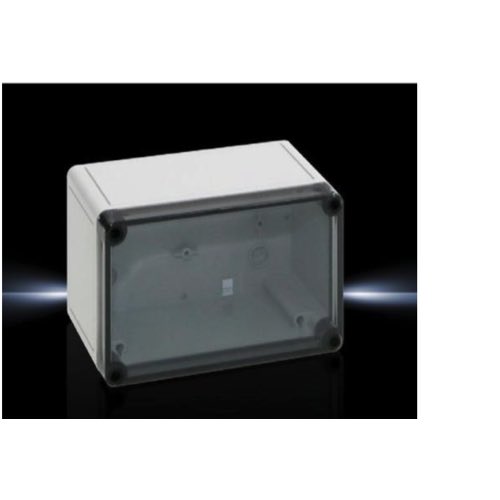Rittal Polycarbonate Enclosures

Rittal polycarbonate enclosures are designed to protect sensitive electrical and electronic components in industrial, commercial, and outdoor environments. This category includes wall-mount enclosures and junction boxes manufactured from high-performance polycarbonate materials that offer excellent impact resistance, corrosion resistance, and long-term stability under ultraviolet (UV) exposure. These enclosures are commonly used in telecommunications, industrial automation, transportation, and infrastructure applications.
User-focused design features make Rittal polycarbonate enclosures efficient to install and service. Hinged covers allow clear visibility and easy access to internal components, improving workflow during installation, inspection, and maintenance. Many models incorporate quick-release fasteners and molded internal mounting features, supporting secure component installation while maintaining enclosure integrity.
Rittal PK polycarbonate enclosures are fiberglass-reinforced and wall-mounted, providing IP66 protection against dust and water ingress. Their non-metallic construction offers high electrical insulation and resistance to harsh environmental conditions without the risk of corrosion.
FAQs
Q: What are Rittal polycarbonate enclosures used for?
Rittal polycarbonate enclosures are used to house and protect electrical and electronic components in industrial, outdoor, and corrosive environments where non-metallic construction is required.
Q: What is fiberglass-reinforced polycarbonate?
Fiberglass-reinforced polycarbonate is a composite material that combines the impact resistance of polycarbonate with the added strength and rigidity provided by fiberglass reinforcement.
Q: Are Rittal polycarbonate enclosures suitable for outdoor use?
Yes, these enclosures offer strong UV resistance, corrosion resistance, and environmental sealing, making them suitable for outdoor installations.
Q: What protection ratings do Rittal polycarbonate enclosures offer?
Many Rittal polycarbonate enclosures provide IP66 protection and meet NEMA 4X requirements, offering resistance to dust, water, and corrosive agents.
Q: Can components be grounded to polycarbonate enclosures?
No, polycarbonate enclosures are non-conductive, so components cannot be grounded to the enclosure itself. However, they provide comparable physical security when properly installed and locked.
Why Buy Rittal Polycarbonate Enclosures from RSP Supply
RSP Supply offers a comprehensive selection of Rittal polycarbonate wall-mount enclosures and junction boxes designed for reliable performance in demanding environments. Our product offerings support industrial, outdoor, and corrosive applications with enclosures built for durability, protection, and ease of installation. Customers rely on RSP Supply for technical expertise, dependable sourcing, and enclosure solutions that meet rigorous application requirements.

